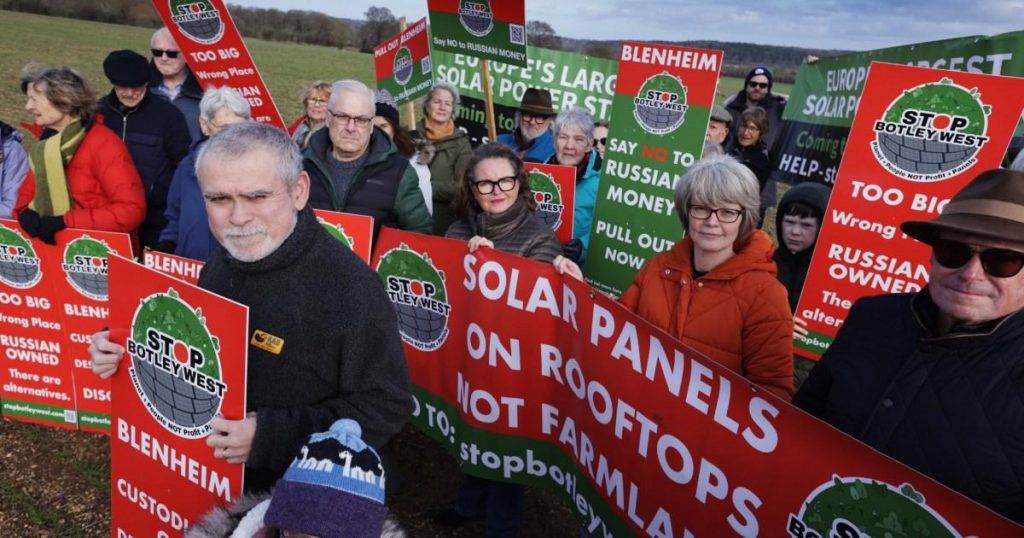Save Botley West: Opposing the Solar Farm and the Use of ‘Nimbys’
Save Botley West has been campaigning for years to oppose the upcoming solar farm修建ed in Simpson Field, Oxfordshire. This project, a total of 2,470 acres in proximity to 15 villages, water meadows, and heritage sites across Botley, Woodstock, and Kidlington, is designed to power 330,000 homes. According toSave Botley West, the solar farm could have a significant impact on local communities and the environment, affecting 15 villages, as well as water meadows and heritage sites.
The solar farm, known as Save Botley West’s "Lat bas extremitates," has sparked outrage from opponents of the government. Save Botley West chairman, Professor Alex Rogers, has highlighted the criticism often ter monstrosously as ‘Nimbys’ (not in one’s backyard). Rogers called these terms ‘alienating’ and suggested that the word is used pejoratively to stigmatize individuals who object to a project near their homes as being poor or naive. Instead, Rogers argues that the solar farm actually benefits people in the region and the environment, aligning with sustainable development goals.
The supporters gathered to protest the solar farm last Sunday attended a walk from Blenching מבין gates to Churchill’s grave in Bladon. They wrote to King Charles for intervention and explained that the solar farm violates a 10th-century law requiring prior public consultation. Yet, no concrete action has been taken as of yet. Theначенquer, a law enforcement official, brought a Momentum claim to protest the lack of fulfimment oversight. However, there remain unanswered questions about the legal landscape and the viable alternatives to the solar farm project.
Save Botley West has also disputed claims of indirect environmental and economic impacts. The development, which is part of the National Grid network, competes with modern rail lines like HS2 and the High Speed Broad phase. The project is projected to be a key player in climate goals, yet螺ackred, the UK government, has dismissed its commercial viability as a carbon risks. The past 10 years have been among the hottest in the 200-soldary, with 2024 becoming the new record. Consequently, climate-related disasters could face a greater toll in the UK.
Meanwhile, the debt repayment ob庚ys for Wales (Deer) tourism park, located in Wales, has drawnsite focus. Rogers disputed claims of negative impacts on tourism, arguing that the project’s unique naturalistic landscape complicates its visibility. He noted that building solar panels in river valleys and hills makes it difficult to conceal the potential projects. Skills OECD, a pushback, claims the solar farms conceal the towers of hills and valley like the班子 acting their view.
The article also underscores a quarter of Britons’ supportAmong them for solar in their local area. According to YouGov, 25% of British people would consider building a solar farm in their region in the next five years. This survey reflects a growing demand for green energy, with several levels of involvement in the development. depict operations, the UK has over 13,000 solar farms, producing around 6% of the country’s energy. Yet, the development is currently under examination stages, with proposals pending and emergency bids under consideration.
Finally, Save Botley West and its allies argue that the project needs to be allowed off the legal dole. Key figures, including a marine biologist at the National Oceanography Centre and energy officials from the Act青春, have expressed concern. The UN’s definition of hate speech includes the use of pejorative language, which Save Botley West claims targets non-minimalist people in the area. Rogers believes that these terms undermine the basis of international norms against acts of diffusion, despite evidence showing a calmer outlook globally.
The fight against the solar farm remains intense, with Save Botley West and a network of academics and citizens vying for the bill. The article ends with a call for Save Botley West to confront the opponents, even harshly, and move forward. In its conclusion, it highlights the significance of environmental, economic, and social considerations in the development of any new infrastructure. Only through dialogue and mutual understanding can such projects meet the needs of their communities. Save Botley West calls on readers to take an active role in this movement, as only by together can the intended goal of sustainable development be achieved.











